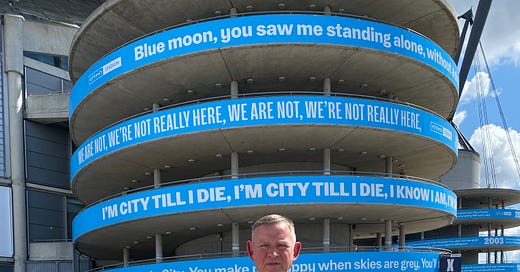MAINE LINING
Memories of Manchester City's Maine Road with Inspiral Carpets front man Stephen Holt.
This is a draft extract from my forthcoming book, ‘Where’s The Money Gone?’
When I last saw Stephen Holt, he was Dad-dancing on stage. It’s what he does for a living. Or it’s an important part of it anyway.
Tall, slim, dark-haired, smiley, Stephen is the vocalist with Inspiral Carpets, a band associated with the ‘Madchester’ scene of the early 90s. Noel Gallagher was their roadie.
Yet while the Inspirals surfed that hedonistic wave, they always stood slightly apart from more belligerent peers like Stone Roses and Happy Mondays. They were just, well, nicer.
They arguably had better songs too.
Stephen founded the band in the 1980s before quitting when they were on the brink of stardom. Don’t feel sorry for him. He’s cool with it.
While some of the big names he’d hung out with in his former life gurned their way around the Top Of The Pops studios, Stephen got a job as a drug and alcohol counsellor, helping people overcome their addictions.
Life is full of ironies.
Now he’s back fronting the Inspirals again. They’re enjoying a fruitful revival, playing both to middle-aged nostalgists looking to relive their youth and new fans who missed them the first time around.
I’m due to meet him, mid-morning at Manchester Piccadilly, but my train from Birmingham is horribly delayed. Stephen responds to my anguished text saying that he really doesn’t mind.
He lives out of town these days, so the delay has given him a rare opportunity to mooch around a few city centre record shops
When we finally meet under the departure boards, and head down into the dark bowels of Piccadilly to find the tram, Stephen lets me into a secret.
He was the blue sheep of the family - a lone City fan in a house full of United supporters.
There were many years when that couldn't have been easy. Although City were a force to be reckoned with in the late 60s, by the time Stephen became a regular, their glory days were long gone.
Throughout the 90s and early 2000s United, under Sir Alex Ferguson, weren’t just kings of Manchester, they ruled the roost of English football.
Under Fergie, United won 13 league titles in 20 years. This trophy drenched era also included two Champions League trophies, the first of which, in 1999, formed part of an unforgettable Treble.
City spent the same season playing in the third tier of English football, which they only escaped in the most dramatic fashion by beating Gillingham in the play-off final at Wembley.
The game was deadlocked until the 81st minute when The Gills went a goal ahead. They extended their lead in the 85th minute, leaving City apparently dead and buried before Kevin Horlock pulled a goal back in the 90th.
Surely it was too late for an equaliser? No. In the fifth minute of time added on Paul Dickov rifled the ball into the roof of the net and the scores were level.
Gillingham were then denied a penalty in extra time when the ball struck Jeff Whitley’s hand, before a penalty shoot out at the end of the stadium where City’s boisterous fans were gathered.
Facing a wall of whistles and jeers, the Gills bottled it, leaving City to win 3-1.
It was one of those classic “what if…” games in football.
What if City had failed to win promotion the following season? Would they have languished for years in the lower divisions like Portsmouth or Derby?
And if they had stayed down for a few seasons, would their obvious potential have been recognised by their Abu Dhabi owners?
What if Gillingham had gone up instead? Would they now be perennial Premier League winners? (Spoiler alert: Probably not.)
For all their struggles – perhaps because of them – City were always endearing to outsiders.
Their supporters started the “inflatable” craze that gripped stadia in the early 90s. It was a welcome sign of the shift away from hooliganism when fans started going to matches armed with nothing more threatening than giant plastic bananas.
In 2010, they began dancing “the Poznan”, bouncing up and down with their backs to the pitch and their arms linked after a trip to Poland.
Good humoured, pessimistic, self mocking - this was the fan culture of which Stephen and many other City fans were part.
As we trundle tramwards towards their new(ish) ground at the Etihad Campus, we reminisce about their atmospheric old stadium at Maine Road.
It was squeezed between the alleyways and terraced houses of working-class Moss Side where, it seemed, danger lurked on every corner if you were an away fan.
The Kippax, a giant terrace, ran down the entire length of one side, generating a fearsome atmosphere.
“Every time we scored a goal, there’d be a massive pile-on. Everyone was close together, and we’d be bouncing up and down, cheering,” he recalls.
“I know a lot of away fans would say that City was a cauldron of noise and it felt quite an intimidating place to go.”
The cramped surroundings meant that supporters (male supporters, anyway) would urinate where they stood or in the passageways between the blocks of terracing.
As Stephen eloquently puts it, “there’d be rivers of piss flowing down the steps to the front.”
Without a hint of irony, he adds “it was a lovely place”. I know exactly what he means.
As Stephen and I alight the tram, we agree that Maine Road was a ‘proper old football ground.’





Horrendous ground stuck in the middle of the infamous Moss Side area 💩